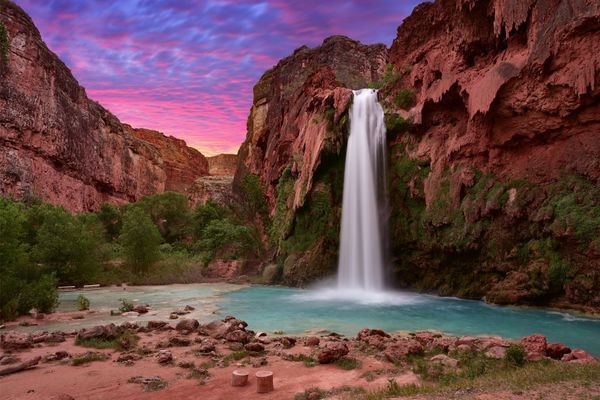
- Details
- By Darren Thompson
On Sunday, Jan. 1, President Biden approved a disaster declaration made by the Havasupai Tribe in northern Arizona for damages the Tribe sustained from severe flooding in October 2022.
The Federal Emergency Management Agency (FEMA) said in a statement that federal emergency aid will be distributed to supplement the Havasupai Tribe’s recovery efforts from the flooding. The Tribe is preparing to re-open the reservation for tourism after it closed its businesses for nearly three years during the COVID-19 pandemic.
 Make A Donation Here
Make A Donation Here
The White House noted, "The President’s action makes federal funding available to Tribal and certain private nonprofit organizations on a cost-sharing basis for emergency work and the repair or replacement of facilities damaged by the flooding. Federal funding is available on a cost-sharing basis for hazard mitigation measures for the Havasupai Tribe.”
The funds will be distributed to the Tribe and other local nonprofit organizations to share costs for emergency work and repairs from flood damage. There has been no published amount of funding to be distributed.
Want more Native News? Get the free daily newsletter today.
The Havasupai Tribe said on its website, “On Oct. 1, 2022, the Tribe also experienced severe flooding, which destroyed several bridges and trails that are needed not only for our tourists but the everyday movement of goods and services into Supai Village.”
The Havasupai Indian Reservation is located in the Grand Canyon on the south side of the Colorado River. It is unreachable by road and is considered one of the most remote Indian reservations in the country. In March 2020, the Tribe closed its borders to protect its members from the pandemic, with Tribal officials extending the closure through the 2022 tourism season. The Tribe announced on its website that it is eager to open its reservation up for visitors on Feb. 1, 2023.
More Stories Like This
Gwich'in Tribal Governments Submit Comments Challenging Fish and Wildlife Service's Inadequate Environmental Review of Arctic Refuge Snow RoadRappahannock Tribe Challenges 9M-Gallon Water Plan
Feds release draft long-term plans for Colorado River management
Apache Leader Walks 60 Miles to Court Hearing That Will Decide Fate of Sacred Oak Flat
Rappahannock Tribe Raises Sovereignty and Environmental Concerns Over Caroline County Water Permit
Help us defend tribal sovereignty.
At Native News Online, our mission is rooted in telling the stories that strengthen sovereignty and uplift Indigenous voices — not just at year’s end, but every single day.
Because of your generosity last year, we were able to keep our reporters on the ground in tribal communities, at national gatherings and in the halls of Congress — covering the issues that matter most to Indian Country: sovereignty, culture, education, health and economic opportunity.
That support sustained us through a tough year in 2025. Now, as we look to the year ahead, we need your help right now to ensure warrior journalism remains strong — reporting that defends tribal sovereignty, amplifies Native truth, and holds power accountable.
 The stakes couldn't be higher. Your support keeps Native voices heard, Native stories told and Native sovereignty defended.
The stakes couldn't be higher. Your support keeps Native voices heard, Native stories told and Native sovereignty defended.
Stand with Warrior Journalism today.
Levi Rickert (Potawatomi), Editor & Publisher
